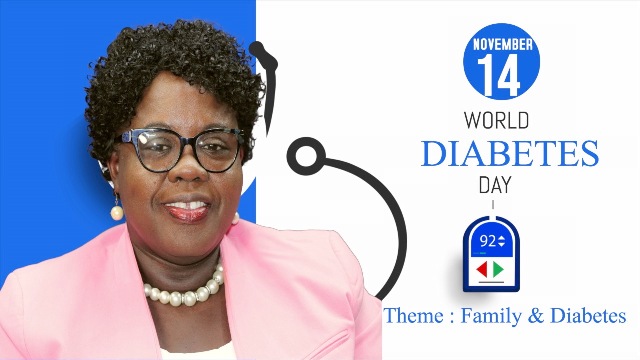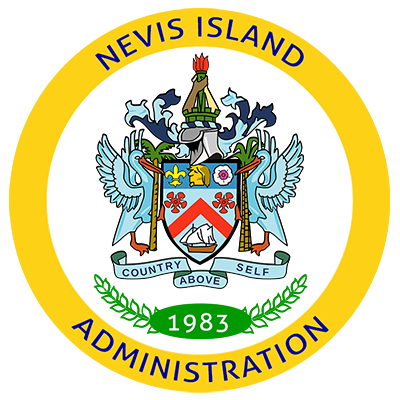Nevis Junior Minister of Health Brandy-Williams delivers address to mark World Diabetes Day

NIA CHARLESTOWN NEVIS (November 14, 2019) — The following is an address delivered by Hon. Hazel Brandy-Williams, Junior Minister of Health in the Nevis Island Administration (NIA) to mark World Diabetes Day 2019.
Diabetes is a serious chronic non-communicable disease, which continues to be a major public health issue here in St. Kitts and Nevis, the region and the world. Particular concern is also expressed for Type 2 diabetes, which accounts for about 90 percent of the cases of diabetes and is associated with lifestyle choices.
Diabetes and its complications represent the majority of mortality and morbidity rates in the Federation. Amputations, blindness, kidney failure are some of the adverse outcomes that add to the statistics of disability and premature deaths. These complications add burdens to families and communities. Efforts, therefore, must continue in all areas of prevention, early detection, and management of diabetes.
On World Diabetes Day, observed on 14th November, these efforts are emphasized through the increase of advocacy, awareness and endeavours for prevention and control of diabetes. The theme, “Family and Diabetes,” which was introduced in 2018, continues in the campaign for this year. It draws attention to the supporting role that the family, and by extension, the community plays in the prevention and control of diabetes, as well as the actions that can be taken to protect families. Each new case of diabetes and its potential for complications can become financial, emotional and physical burdens on the individual, their families and communities, if not properly controlled.
Health services spend large sums of money on managing poorly controlled diabetes and its complications, through repeated admissions and expensive treatment such as amputations, dialysis and cardiac interventions. Productivity at work and at home can be significantly hampered, thereby adding to the economic burden.
Although Type 1 diabetes cannot be prevented, Type 2 diabetes can be prevented and controlled. The WHO [World Health Organization] /PAHO [Pan American Health Organization] emphasizes that strong robust public policies and adherence to healthy lifestyles are key in prevention of Type 2 diabetes. In this light, the Ministry of Health continues to develop policies and provide services to address the various components of chronic disease prevention and control.
Annual reports reveal that in Nevis, there were 455 registered diabetics accessing care at our community health centres for 2018. Eighty-seven percent of this number were Type 2 diabetics. There was a slight decrease in the total compared to 2017, when there were 473 registered diabetics. Even though there is a general downward trend in the totals over the past six years, there is still much more work to do in the area of behaviour and lifestyle change, to reduce the incidences of Type 2 diabetes.
Every new diabetic discovered early is an opportunity to intervene, control the disease and prevent the development of complications. Screening opportunities are readily available at all six health centres and through the various outreach activities, undertaken by the Community Nursing Services and Health Promotion Unit, in collaboration with other public and private sector agencies.
The WHO /PAHO estimates that 30 to 40 percent of cases of diabetes are undiagnosed. Therefore, every opportunity to have a test should be taken to allow for early detection, as there may be no symptoms initially.
Additionally, screening for complications of diabetes is also available through the chronic disease programme offered at our clinics. Persons affected with diabetes receive foot care, eye examinations, EKG [Electrocardiogram] testing and routine lab tests checking for any early signs of nerve, blood vessel, kidney and heart damage.
Additionally, medication and testing strips are readily available, free of cost or at a reduced price, to persons with diabetes, thereby eliminating the financial barrier that can prevent persons from accessing the medicine that they need. Health care workers also receive ongoing education on the best practices to allow for optimum management of cases.
Furthermore, the Ministry of Health recognizes that having diabetes can be challenging as it requires strict dietary, weight and medical control. For some persons it requires a complete change in lifestyle. To address this aspect of self-care and management, this year, persons were offered the opportunity to participate in a chronic disease self-management programme which imparted knowledge and skills on healthy living.
This type of programme coupled with support groups such as a diabetes association will augur positive outcomes, as opportunities for encouragement and knowledge sharing about best practices, for the development of healthy habits can help an individual in the control of his or her diabetes.
In closing, I implore you to take advantage of the free services the Ministry of Health offers for prevention and control of diabetes. I also implore you and your families to develop healthy lifestyles to reduce the risk of developing Type 2 diabetes. These include engaging in at least 30 minutes of exercise every day, maintaining a healthy body weight, eating fruits and vegetables, and avoiding sugar-sweetened beverages.
Additionally, you can join programmes such as the recently launched SKN Moves Nevis Chapter and the National Weight Loss Campaign, which aim to increase physical activity and the practice of healthy living.
For those who are already diabetics, in addition to the recommendations mentioned, please seek care and follow your health care providers’ advice, to prevent the development of complications. Involve your family and let’s all join together and support each other in preventing and controlling diabetes.
